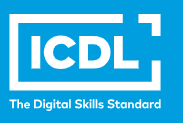
ICDL Asia is a subsidiary of ICDL Foundation, the not-for-profit certifying authority of ICDL.
Established to guide the implementation of the ICDL standards in the Asian context, ICDL Asia manages the accreditation of a growing network of ICDL Accredited Test Centers (ATCs), and provides a focal point for the formation of partnerships with organisations who share our national economic development and capacity building goals.
ICDL Asia recognises the importance of digital literacy and ICT skills, and the urgent need for a more coordinated and effective action in driving economic development across Asia.
The quality and reputation of ICDL is built on over twenty-five years of experience in delivering our certification programmes to over 17 million people and in more than 40 languages worldwide, with more than 2.5 million ICDL tests taken annually.
Our success is maintained by our ongoing innovation in certification programme development, our commitment to rigorous test design methodologies, and consistent adherence to our quality assurance standards.
ICDL Foundation is an international organisation dedicated to raising digital competence standards in the workforce, education and society.
Our certification programmes, delivered through an active network in more than 100 countries, enable individuals and organisations to assess, build and certify their competence in the use of computers and digital tools to the globally-recognised ICDL standard.
As a non-profit social enterprise, ICDL Foundation benefits from the unique support of experts from national computer societies and partners worldwide to develop vendor-independent standards that define the skills and knowledge required to use digital technology effectively.
We work with education and training partners, local and regional authorities, national governments, international development organisations as well as public and private sector employers in all sectors, in the delivery of our programmes.
ICDL Foundation supports the initiatives of National Operators of the programme in Europe and the Arab States from our headquarters in Dublin, Ireland and our ICDL Europe office in Brussels, Belgium.
We have also established two regional operations – ICDL Africa (based in Rwanda) and ICDL Asia (based in Singapore). All ICDL Foundation operations work closely with regional, national and local partners to develop the global network of ICDL Accredited Test Centers.
Mission:
ICDL Foundation’s mission is to enable proficient use of Information and Communication Technology (ICT) that empowers individuals, organisations and society, through the development, promotion, and delivery of quality certification programmes throughout the world.
Values:
ICDL Foundation’s values are:
Social Responsibility: as a not-for-profit organisation, we are committed to improving digital skills proficiency within society. Our certification programmes are designed to be accessible to all citizens, irrespective of age, gender, status, ability or race.
Vendor Independence: our certification programmes give candidates the flexibility and freedom to acquire digital skills and confidently apply them in any software environment that they may be required to use.
Quality: we strive for continuous improvements in all that we do and ensure that our programmes are implemented to consistent standards internationally.

The Using Databases module sets out essential concepts and skills relating to understanding the concept of a database and demonstrating competence in using a database application.

The Artificial Intelligence module introduces the potential of artificial intelligence (AI) – the intelligence demonstrated by a machine when it perceives its environment and takes actions that maximise the likelihood of achieving specific goals.

The Cloud Computing module introduces the use of Internet-connected remote servers to store, manage, and process data, instead of using local servers or computers.

The IoT module introduces the Internet of Things, which extends Internet connectivity from computers and related devices to other physical devices or common objects and leverages from technologies such as embedded systems, wireless sensors, and automation.

This module introduces Big Data, a term which relates to the management and analysis of sets of data that are typically too large for traditional data-processing software.
© 2025 coursetakers.com All Rights Reserved. Terms and Conditions of use | Privacy Policy